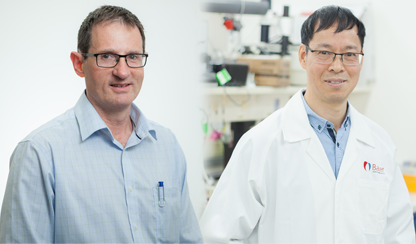15 March 2023
Institute news

Professor David Kaye and Associate Professor Bing Wang have been granted close to $1M in MRFF funding to develop inhibitors for an enzyme known to be a critical factor in the development of the predominant form of heart failure, HFpEF (Heart failure with preserved ejection fraction).
There are very few effective treatments for heart failure with preserved ejection fraction (HFpEF), which has a five-year mortality rate as high as 75 per cent. But Prof Kaye’s Medical Research Futures Fund (MRFF) Cardiovascular Health Grant will help support his team to find answers to this growing and often fatal condition.
Oxidative stress (excess free radicals) and inflammation pathways are critical contributors to the development and progression of HFpEF. For many of those activated pathways, the enzyme ASK1 sits at the junction and regulates signals that respond to the inflammation and oxidative stress, leading to HFpEF.
Prof Kaye, Head of the Baker Institute Heart Failure Research Group, hopes that the development of ASK1 inhibitors may provide a treatment and management strategy that can reduce the development and progression of HFpEF.
“Inflammation and oxidative stress are the key factors driving HFpEF pathologies,” Prof Kaye said. “The enzyme ASK1 is the convergent point of HFpEF pathologies so is a potential therapeutic target.
“Our aim is to conduct preclinical development and validation of this novel molecular target ASK1 for cardiovascular disease (CVD), particularly for HFpEF. By leveraging our recent discoveries and investigation outcomes, we will work towards the development and validation of ASK1 inhibitors as a new treatment and management strategy that ameliorates the pathological effects contributing to the development and progression of CVD specifically for HFpEF.
“Ultimately, we hope we can improve the quality of life for patients with HFpEF.”
The prevalence of HFpEF is increasing worldwide, driven by an ageing population and simultaneous growth in risk factors including obesity, diabetes and hypertension (high blood pressure), Prof Wang said.
“With no current effective evidence-based treatment for HFpEF, and high mortality rates, the development of an effective treatment for HFpEF is widely acknowledged as one of the highest priorities in cardiovascular medicine,” he said.
Prof Kaye, who is also a cardiologist and Director of the Department of Cardiology at The Alfred, and Prof Wang, our Biomarker Discovery lab Head, will receive $998,334 over three years from the MRFF to conduct this research at the Baker Institute.





